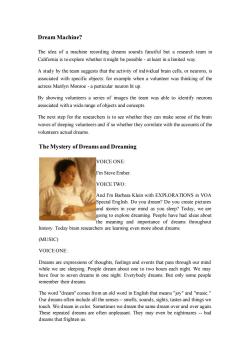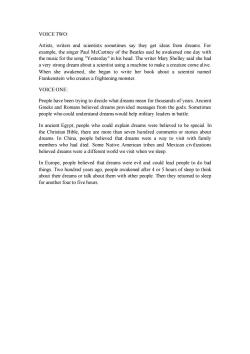《新编大学英语》综合教程(第三版第二册)B2U5_Self-market_Listening Material_Transcript

Dream Machine? The idea of a machine recording dreams sounds fanciful but a research team in California is to explore whether it might be possible-at least in a limited way A study by the team suggests that the activity of individual brain cells,or neurons,is associated with specific objects:for example when a volunteer was thinking of the actress Marilyn Monroe-a particular neuron lit up. By showing volunteers a series of images the team was able to identify neurons associated with a wide range of objects and concepts. The next step for the researchers is to see whether they can make sense of the brain waves of sleeping volunteers and if so whether they correlate with the accounts of the volunteers actual dreams. The Mystery of Dreams and Dreaming VOICE ONE: I'm Steve Ember. VOICE TWO: And I'm Barbara Klein with EXPLORATIONS in VOA Special English.Do you dream?Do you create pictures and stories in your mind as you sleep?Today,we are going to explore dreaming.People have had ideas about the meaning and importance of dreams throughout history.Today brain researchers are learning even more about dreams. (MUSIC) VOICE ONE: Dreams are expressions of thoughts,feelings and events that pass through our mind while we are sleeping.People dream about one to two hours each night.We may have four to seven dreams in one night.Everybody dreams.But only some people remember their dreams. The word "dream"comes from an old word in English that means "joy"and "music." Our dreams often include all the senses-smells,sounds,sights,tastes and things we touch.We dream in color.Sometimes we dream the same dream over and over again. These repeated dreams are often unpleasant.They may even be nightmares--bad dreams that frighten us
Dream Machine? The idea of a machine recording dreams sounds fanciful but a research team in California is to explore whether it might be possible - at least in a limited way. A study by the team suggests that the activity of individual brain cells, or neurons, is associated with specific objects: for example when a volunteer was thinking of the actress Marilyn Monroe - a particular neuron lit up. By showing volunteers a series of images the team was able to identify neurons associated with a wide range of objects and concepts. The next step for the researchers is to see whether they can make sense of the brain waves of sleeping volunteers and if so whether they correlate with the accounts of the volunteers actual dreams. The Mystery of Dreams and Dreaming VOICE ONE: I'm Steve Ember. VOICE TWO: And I'm Barbara Klein with EXPLORATIONS in VOA Special English. Do you dream? Do you create pictures and stories in your mind as you sleep? Today, we are going to explore dreaming. People have had ideas about the meaning and importance of dreams throughout history. Today brain researchers are learning even more about dreams. (MUSIC) VOICE ONE: Dreams are expressions of thoughts, feelings and events that pass through our mind while we are sleeping. People dream about one to two hours each night. We may have four to seven dreams in one night. Everybody dreams. But only some people remember their dreams. The word "dream" comes from an old word in English that means "joy" and "music." Our dreams often include all the senses – smells, sounds, sights, tastes and things we touch. We dream in color. Sometimes we dream the same dream over and over again. These repeated dreams are often unpleasant. They may even be nightmares -- bad dreams that frighten us

VOICETWO: Artists,writers and scientists sometimes say they get ideas from dreams.For example,the singer Paul McCartney of the Beatles said he awakened one day with the music for the song "Yesterday"in his head.The writer Mary Shelley said she had a very strong dream about a scientist using a machine to make a creature come alive. When she awakened,she began to write her book about a scientist named Frankenstein who creates a frightening monster. VOICE ONE: People have been trying to decide what dreams mean for thousands of years.Ancient Greeks and Romans believed dreams provided messages from the gods.Sometimes people who could understand dreams would help military leaders in battle. In ancient Egypt,people who could explain dreams were believed to be special.In the Christian Bible,there are more than seven hundred comments or stories about dreams.In China,people believed that dreams were a way to visit with family members who had died.Some Native American tribes and Mexican civilizations believed dreams were a different world we visit when we sleep. In Europe,people believed that dreams were evil and could lead people to do bad things.Two hundred years ago,people awakened after 4 or 5 hours of sleep to think about their dreams or talk about them with other people.Then they returned to sleep for another four to five hours
VOICE TWO: Artists, writers and scientists sometimes say they get ideas from dreams. For example, the singer Paul McCartney of the Beatles said he awakened one day with the music for the song "Yesterday" in his head. The writer Mary Shelley said she had a very strong dream about a scientist using a machine to make a creature come alive. When she awakened, she began to write her book about a scientist named Frankenstein who creates a frightening monster. VOICE ONE: People have been trying to decide what dreams mean for thousands of years. Ancient Greeks and Romans believed dreams provided messages from the gods. Sometimes people who could understand dreams would help military leaders in battle. In ancient Egypt, people who could explain dreams were believed to be special. In the Christian Bible, there are more than seven hundred comments or stories about dreams. In China, people believed that dreams were a way to visit with family members who had died. Some Native American tribes and Mexican civilizations believed dreams were a different world we visit when we sleep. In Europe, people believed that dreams were evil and could lead people to do bad things. Two hundred years ago, people awakened after 4 or 5 hours of sleep to think about their dreams or talk about them with other people. Then they returned to sleep for another four to five hours
按次数下载不扣除下载券;
注册用户24小时内重复下载只扣除一次;
顺序:VIP每日次数-->可用次数-->下载券;
- 《新编大学英语》综合教程(第三版第二册)B2U5_Self-market_06 B2U05 QUIZ.doc
- 《新编大学英语》综合教程(第三版第二册)B2U5 Translation & Writing.ppt
- 《新编大学英语》综合教程(第三版第二册)B2U5 Read by critical thinking.ppt
- 《新编大学英语》综合教程(第三版第二册)B2U5 Menu.ppt
- 《新编大学英语》综合教程(第三版第二册)B2U5 Activate.ppt
- 《新编大学英语》综合教程(第三版第二册)B2U4_Spellbound.docx
- 《新编大学英语》综合教程(第三版第二册)B2U4_Self-market_Writing Material_推展段落方法之——举例法.docx
- 《新编大学英语》综合教程(第三版第二册)B2U4_Self-market_Samples.docx
- 《新编大学英语》综合教程(第三版第二册)B2U4_Self-market_Reading Material_The Psychology of Money.doc
- 《新编大学英语》综合教程(第三版第二册)B2U4_Self-market_Reading Material_Marriage Wards off Blues.doc
- 《新编大学英语》综合教程(第三版第二册)B2U4_Self-market_Reading Material_Leisure Guilt.docx
- 《新编大学英语》综合教程(第三版第二册)B2U4_Self-market_Reading Material_Desk Psychology.doc
- 《新编大学英语》综合教程(第三版第二册)B2U4_Self-market_Listening Material_Transcript.docx
- 《新编大学英语》综合教程(第三版第二册)B2U4_Self-market_06 B2U04 QUIZ.doc
- 《新编大学英语》综合教程(第三版第二册)B2U4 Translation & Writing.ppt
- 《新编大学英语》综合教程(第三版第二册)B2U4 Read by critical thinking.ppt
- 《新编大学英语》综合教程(第三版第二册)B2U4 Menu.ppt
- 《新编大学英语》综合教程(第三版第二册)B2U4 Activate.ppt
- 《新编大学英语》综合教程(第三版第二册)B2U3_Self-market_Writing Material_如何写好一个段落2.docx
- 《新编大学英语》综合教程(第三版第二册)B2U3_Self-market_Samples.docx
- 《新编大学英语》综合教程(第三版第二册)B2U5_Self-market_Reading Material_Meanings in Dreams.docx
- 《新编大学英语》综合教程(第三版第二册)B2U5_Self-market_Reading Material_关于梦境:十个你可能不知道的真相.docx
- 《新编大学英语》综合教程(第三版第二册)B2U5_Self-market_Reading Material_梦是黑白的还是彩色的.docx
- 《新编大学英语》综合教程(第三版第二册)B2U5_Self-market_Reading Material_盲人的梦境里有画面吗.docx
- 《新编大学英语》综合教程(第三版第二册)B2U5_Self-market_Sample.docx
- 《新编大学英语》综合教程(第三版第二册)B2U5_Self-market_Writing Material_推展段落方法之——叙述法.docx
- 《新编大学英语》综合教程(第三版第二册)B2U6 Activate.ppt
- 《新编大学英语》综合教程(第三版第二册)B2U6 Menu.ppt
- 《新编大学英语》综合教程(第三版第二册)B2U6 Read by critical thinking.ppt
- 《新编大学英语》综合教程(第三版第二册)B2U6 Translation & Writing.ppt
- 《新编大学英语》综合教程(第三版第二册)B2U6_Self-market_06 B2U06 QUIZ.doc
- 《新编大学英语》综合教程(第三版第二册)B2U6_Self-market_Listening Material_Transcript.docx
- 《新编大学英语》综合教程(第三版第二册)B2U6_Self-market_Reading Material_Food and Mood.docx
- 《新编大学英语》综合教程(第三版第二册)B2U6_Self-market_Reading Material_Is chocolate really good for me.docx
- 《新编大学英语》综合教程(第三版第二册)B2U6_Self-market_Reading Material_每天吃相同的食物会影响健康吗.docx
- 《新编大学英语》综合教程(第三版第二册)B2U6_Self-market_Samples.docx
- 《新编大学英语》综合教程(第三版第二册)B2U6_Self-market_Writing Material_推展段落方法之——比较与对比法.docx
- 《新编大学英语》综合教程(第三版第二册)B2U6_料理鼠王transcript.docx
- 《新编大学英语》综合教程(第三版第二册)B2U4_Self-market_06 B2U04 QUIZ_B2U4 Oral Quiz.ppt
- 《新编大学英语》综合教程(第三版第二册)B2U3_Self-market_B2U03 QUIZ_06 B2U3 Quiz.doc
